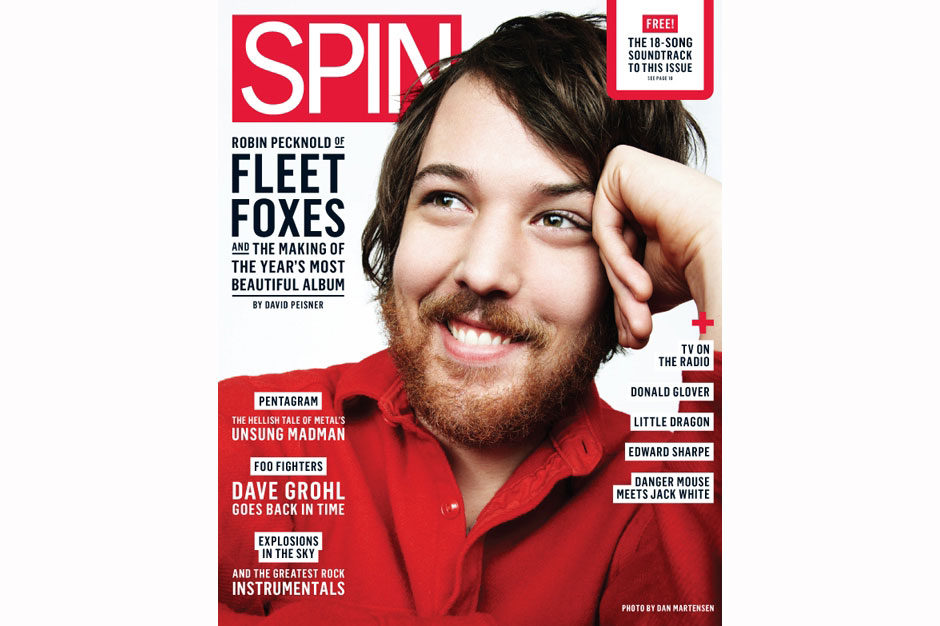For Robin Pecknold, following up Fleet Foxes’ beloved debut wasn’t just a labor of love — it was an all-consuming head trip. David Peisner goes to Seattle and finds an artist who’s still learning where his off switch is. [Magazine Excerpt]
Robin Pecknold stands outside a small triangle-shaped building in the Seattle neighborhood of Ballard, wearing a weathered green barn jacket over his slight frame and smoking an American Spirit. An unkempt mop of brown hair and a scraggly beard frame his longish face and tired eyes, and his shoulders are hunched a bit to protect himself from a cool, late February breeze blowing in off the Puget Sound, which lies a few blocks to the west.
The building behind him is a recording studio that has carried various names over the past three decades — Triangle, John and Stu’s, the Hall of Justice — but is currently referred to by the name it carried in the late ’80s and early ’90s when it served as a vital grunge incubator: Reciprocal Recording. If the place had a Wall of Fame, Nirvana’s Bleach, Soundgarden’s Screaming Life, and Mudhoney’s Superfuzz Bigmuff would line it.
But this building doesn’t have a Wall of Fame. In fact, it’s kind of a shithole. The windowless exterior was once painted brown, but the color has faded and flecked off. Cracked shingles curl up off the roof, and inside the studio, tattered walls and well-worn carpeting give it all the charm of an abandoned church basement. Peck-nold speaks warily of a “potential rat problem” originating from the nearby wharfs.
Reciprocal has been something of a second home for Pecknold and his band, Fleet Foxes, during the past year as they’ve been writing and recording their second full-length album, Helplessness Blues. They’ve had the place to themselves since January 2010, but today is moving day. Much of the band’s gear has already been relocated to bassist Christian Wargo’s rehearsal space, and three men from a local moving company are tasked with shuttling much of the rest of it into a storage facility across the street.
Pecknold stubs out his cigarette and walks back inside the studio to give the movers some instructions. There are boxes of recording equipment, mic stands, a beat-up couch, a harp, a dulcimer, a zither, and an old piano that’s missing some of its outer paneling. In the corner, near the harp, is a neatly rolled blue sleeping bag. When I point to it, Pecknold nods.
“Yeah, I slept here a few nights,” he says drily.
The storage space across the street is only temporary. In early April, Pecknold plans to pack all his stuff into a truck and relocate to Portland. The move is just three hours south on I-5, but for a guy who has grown up and spent all his 25 years in and around Seattle, it seems significant.
“The album and the band have really been all my life has been about for a long time,” he says. “It just feels like time to try something else. This is a chance to live a little.”
As Pecknold watches the contents of the studio being loaded into a truck, it certainly feels like the closing of a chapter and a symbolic end to the more than two-year period he and the band — which, along with Wargo, includes guitarist Skyler Skjelset, drummer Josh Tillman, keyboardist Casey Wescott, and multi-instrumentalist Morgan Henderson — spent laboring over the new album’s ambitious, emotional indie-folk epics. That the end result doesn’t just deliver on the promise of its acclaimed predecessor but eclipses it is of some comfort.
“It feels really good to have the second one done,” Pecknold says. “I really had trouble letting go of the record. Spending so much time on this album, being this really focused, self-involved guy isn’t healthy in the other aspects of my life. At a certain point you’ve got to shut the outside world out and let things go to hell while you’re trying to do what you feel you’ve got to do. But that’s just something I’m growing less and less comfortable with.”
Pecknold and Skjelset, also 25, have been playing guitar together since they were teens. An early incarnation of the band was gigging around Seattle by 2006. That same year, they recorded a demo with producer Phil Ek (the Shins, Modest Mouse) that was posted online as a self-titled EP. In retrospect, that record — with its hazy psych-pop melodies and prominent electric guitars — feels like an outlier next to the largely acoustic output that would follow.
Wescott, 30, who’d been playing in Wargo’s stylish indie-pop band, Crystal Skulls, joined Fleet Foxes shortly after the EP was finished. “It was an interesting period because Robin was trying to go in a different direction,” he says. “We were really pushing ourselves to have new material for each show and really develop it.”
Pecknold was listening to a lot of Beach Boys back then, as well as the Zombies and Crosby, Stills & Nash. He fell in love with the vocal harmonies that all three groups are famous for and soon was working them into Fleet Foxes material.
Sub Pop signed the band in 2007, and after an introductory EP, Sun Giant, it released Fleet Foxes’ self-titled full-length the following year. Warm, ethereal three- and four-part harmonies adorn nearly every song on Fleet Foxes, weaving between finger-picked acoustic guitar melodies and homey percussion. Imagistic lyrics about red squirrels, white snow, yellow moons, and the Blue Ridge Mountains gave the impression that the band members were back-to-the-land hippies, an impression only reinforced by their shaggy locks and prodigious beards.
“It’s easy to think of yourself as this complicated individual,” Pecknold says. “But when your 11-song album and your press photo is all people have to make an opinion about you, then obviously it’s going to be somewhat reductive.”
Wargo, 34, who had come of age in Christian rock’s indie wing playing with the bands Pedro the Lion and the Danielson Famile and had lived for several years on the Jesus People USA commune in Chicago, joined the band as they were finishing the first album, in time to play on the Sun Giant EP (which was recorded after the full-length but released before it). Several months later, Tillman, 30, who’d released several low-key singer-songwriter albums as J. Tillman, replaced original drummer Nicholas Peterson. Henderson, 32, formerly of the Seattle art-punk freaks the Blood Brothers, came aboard in 2010.
The reaction to Fleet Foxes was glowing. While some critics lumped the band in with the freak-folk movement that artists like Joanna Newsom, Devendra Banhart, and Animal Collective have been (often unwillingly) attached to, Pecknold’s affection for classic songsmiths such as Brian Wilson, Neil Young, and Van Morrison rendered Fleet Foxes more immediately accessible.
“Not many people making music right now affect me the way Fleet Foxes do,” says Newsom, who invited Pecknold to open shows for her in 2010. “I love the instrumentation and the harmonies, but what stands out first and foremost is the songwriting. Getting to hear Robin play solo on those shows we did last spring really underscored all the amazing stuff that’s going on at the core of it.”
Heavy online buzz, consistent love from influential noncommercial radio outlets like Los Angeles’ KCRW, Seattle’s KEXP, and especially NPR, combined with heavy touring helped the charming, pastoral indie-folk song cycle sell way more than charming, pastoral indie-folk song cycles are supposed to–nearly 400,000 copies in the U.S. alone.
“Our first album did ten times the sales that I’m even comfortable with,” Pecknold says. “I have zero aspirations beyond anything we’ve already accomplished.”
That’s where he may be alone. The industry has shifted dramatically in the last five years, but the pillars of Fleet Foxes’ commercial success — touring, music blogs, NPR, Starbucks, and the fact that their fan base consists largely of people old enough to be in the habit of paying for music — have not. It’s a formula that has helped Mumford & Sons sell more than a million albums in both the U.S. and the U.K., and Iron & Wine debut at No. 2 on the Billboard album chart earlier this year. So it’s not surprising that Sub Pop founder Jonathan Poneman thinks this is as big a release as any in the label’s history. “There is more interest and greater expectations,” he says. “As a musical accomplishment, it’s hard for me to think of a record that we’ve put out that surpasses this record. Even if they were to stop now, this is a career-defining work.”
The band have tried not to let outside expectations influence them, but, as Wargo puts it, “That’s easier said than done.”
Read the complete feature in the May issue of SPIN, available now for the iPad and on newsstands.





